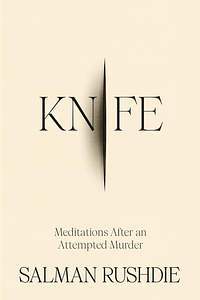Take a photo of a barcode or cover
challenging
emotional
inspiring
reflective
medium-paced
adventurous
challenging
dark
emotional
hopeful
informative
inspiring
reflective
tense
medium-paced
challenging
dark
emotional
hopeful
informative
inspiring
reflective
tense
medium-paced
Massive warning straight out of the gate: Rushie does NOT sugarcoat the knife attack, nor the many surgeries he required, nor his rehabilitation. In short, if you are squeamish, especially surrounding eyes, don't read this. Do the Coles Notes instead. That said, I was squeamish for parts of this, but I powered through, because his story is important. The freedom to write and say as you please should never be taken lightly. Never underestimate the power of a book.
The first part of this book (The Angel of Death) was the hardest part for me to get through. This was where he detailed the assassination attempt, along with his stay in-hospital, and rehabilitation. Basically, all the crucial but squeamish stuff happened here.
The second part (The Angel of Life) was about moving forward with his new, altered life. My favourite chapter in the entire book happened here. "The A." was the conversation inside his head that we've all had in some capacity, where we imagine a conversation we'd like to either have with someone, or wish we'd had. In Rushdie's case, he used it to say how he's the fortunate one as he gets to carry on living, while The A. threw his life away and has become irrelevant. In short, Rushdie decides that The A. is no longer worthy of living rent-free inside his head.
Rushdie admits that Knife isn't exactly closure per se, but now that he's written it, he can freely move forward with his life and write any which way he pleases.
The first part of this book (The Angel of Death) was the hardest part for me to get through. This was where he detailed the assassination attempt, along with his stay in-hospital, and rehabilitation. Basically, all the crucial but squeamish stuff happened here.
The second part (The Angel of Life) was about moving forward with his new, altered life. My favourite chapter in the entire book happened here. "The A." was the conversation inside his head that we've all had in some capacity, where we imagine a conversation we'd like to either have with someone, or wish we'd had. In Rushdie's case, he used it to say how he's the fortunate one as he gets to carry on living, while The A. threw his life away and has become irrelevant. In short, Rushdie decides that The A. is no longer worthy of living rent-free inside his head.
Rushdie admits that Knife isn't exactly closure per se, but now that he's written it, he can freely move forward with his life and write any which way he pleases.
Graphic: Body horror, Gore, Hate crime, Physical abuse, Torture, Violence, Blood, Religious bigotry, Medical trauma
challenging
dark
emotional
inspiring
Searing memoir from one of our greatest living writers.
“God did not hand down morality to us. We created God to embody our moral instincts”
“The battleground is not the only battlefield. The stories we live in are contested territories too. Perhaps we can seek to emulate Joyce’s Dedalus, who sought to forge in the smithy of his soul the uncreated conscience of his race. We can emulate Orpheus and sing in the face of horror, and not stop singing until the tide turns, and a better day begins.
“God did not hand down morality to us. We created God to embody our moral instincts”
“The battleground is not the only battlefield. The stories we live in are contested territories too. Perhaps we can seek to emulate Joyce’s Dedalus, who sought to forge in the smithy of his soul the uncreated conscience of his race. We can emulate Orpheus and sing in the face of horror, and not stop singing until the tide turns, and a better day begins.
hopeful
inspiring
reflective
fast-paced
Salman Rushdie writes Knife to, I believe, understand his attack, his attacker, and his own life within the context of this 27 second encounter. It must have been weird to survive the early years of the fatwa relatively unscathed and then have someone try to kill you in a small town at some nerdy writers’ event. I enjoyed listening to Mr. Rushdie read his own words with emotion, reliving the memory of his experience.
emotional
reflective
medium-paced
emotional
hopeful
inspiring
slow-paced
Graphic: Violence
challenging
dark
emotional
hopeful
reflective
tense
medium-paced
challenging
emotional
funny
hopeful
reflective
slow-paced
I don’t always agree with what rushdie has to say, but I always love hearing him say it. he is thoughtful, eloquent, and funny

